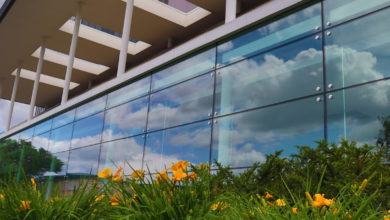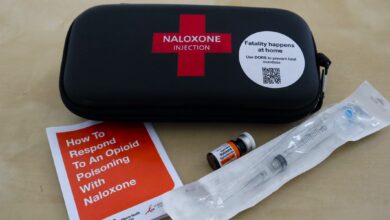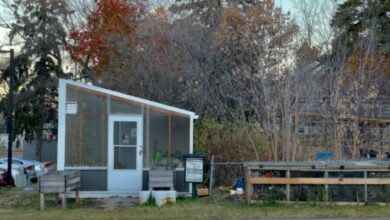YEG Music: A beginner’s guide
 Miguel Aranas
Miguel AranasDo you have a band but have no idea where to begin booking shows? Do you have painfully boring weekends and some extra cash? Do you want to feel connected to the city in more ways than through the U of A? There are many reasons why you should be stoked about the music scene in Edmonton, but a lot of people aren’t sure where to begin. Here’s a handy guide to help you figure out the basics of the local music scene and how to get involved.
What is “the music scene?”
The intricate network of musicians who get together and provide the city with fresh and exciting beats in Edmonton is growing. This is regarded as “the music scene.”
Craig Martell, part-time comedian and full-time owner of Edmonton’s Wunderbar, figures there are a few thousand bands in Edmonton.
“Some are friends. Some aren’t. Some know each other, some don’t,” says Martell.
Based on sheer numbers alone, there’s definitely something in this city for everybody to enjoy. So what makes Edmonton’s music scene so great?
Dan Lenz, the man behind concert promotion company Blurred Lenz, says Edmontonians are open to and supportive of new ideas in music an uncommon attitude that allows the variety of genres in the city to thrive.
“Because of that, I think there is a commonality that transcends the different pockets in the scene,” he says.
Whether you’re a metal-head or a folk junkie, odds are you’ll be welcomed with open arms into the music community. Unlike other cities where bands may try to cut each other down, Edmonton musicians have a reputation for supporting one another.
Beyond music, there’s a lot that draws people together into a community, says Dean Kheroufi, of a dozen bands including N3K and Layton Kramer.
“We live in a province where we could easily make more doing something else with little to no education, so there’s a real community that’s formed around us choosing to play music and be ‘poor,’” he says. “Edmonton’s music scene is great because of how supportive it is.”
Where are the venues?
There are a handful of different venues around the city, with more consistently opening up every few months or so, while others occasionally become distant memories. Here’s a quick overview of just a few of the venues around Edmonton:
Wunderbar (8120 101 Street)
Capacity: 84
Wunderbar has definitely been a staple in the Edmonton music community for the five years that Craig Martell has been running it. With such a small room and the endearing motto “Life is too short for Top 40. Life is too short for factory art. Life is too short for shitty beer,” on their website, it’s no wonder Wunderbar stands as the mecca for underground music. Many of Edmonton’s great bands started here, including the up-and-coming indie-rock troupe Consilience.
“Hopefully Wunderbar stays afloat forever. That place has helped so many bands grow, and it’s really been the hub of all this positivity,” says Consilience singer/guitarist Tasy Hudson.
Artery (9535 Jasper Avenue)
Capacity: 149
The door to the Artery looks like a sketchy red door into a dive bar to the untrained eye. But, like Narnia being hidden in a wardrobe, the inside of the Artery is easily the most aesthetically pleasing combination of an art gallery and a music venue. With an exceptional selection of craft beer and the occasional grilled-cheese night, it’s as much of a treat for your taste buds as it is for your ears. The Artery is a great mid-sized venue with reasonably priced tickets and is a great place to see touring bands from around Canada play with your local favourites.
As owner Philip Muz succinctly puts it, “the Artery is a unique and inclusive multidisciplinary art, music, and performance space driven by community and a vital part of our local arts and culture.”
Pawnshop (10551 82 Avenue)
Capacity: 275
Settled in among all of the hub-bub of Whyte Avenue is Pawnshop. Although it’s called “Pawnshop,” it’s definitely not the place where your weird uncle bought a lampshade that smells like stale cat pee. Rather, it’s a midsize venue featuring everything from local metal bands to national dance-pop acts. With a nice backstage for bands to hang out, it’s a great venue at which to attend or perform. Open Friday and Saturday nights, Pawnshop is definitely a good place to catch a show without risking sleeping in past your first class.
Starlite Room (10030 102 Street)
Capacity: 400
Starlite Room is the ideal venue for a classic concert experience and is typically reserved for large, out-of-province or even international acts. With an angled floor so almost everybody gets a view of the stage and three bars conveniently placed in different proximities to stage, you get to decide whether you’re dancing at the front or saving your hearing at the back. Although it’s a wonderful venue for live music, it’s not necessarily the best place to fall in love with the local music scene.
“Currently there isn’t a band that can regularly fill the Starlite Room. I hope that is something that will change,” Lenz says. “Be it less bands moving away or just someone that captures audiences.”
This is, of course, not an all-inclusive list. There are several other music venues around the city, with loads more once you include bars that feature musicians on a weekly or monthly basis, including the all-ages favourite Cha Island and the rapscallion bar Black Dog.
What goes into putting on a show?
When a band first decides to throw themselves into the scene, it can be difficult to get started. Usually, the best place to start is with a promoter, either from a fitting venue or freelance.
“I need to hear them, I need to see what they use for internet promotion and know what show history they’ve had. I need to see a picture. Any of these things can make me not book a band,” says Martell.
Once it’s been decided that a band is ready to perform, the real work begins. According to Lenz, there are eight major steps to ensure an event runs smoothly: the venue needs to be booked, the bands need to be finalized, a sound tech needs to be hired, a poster needs to be designed, an event page needs to be created, the show needs to be promoted, tickets need to be sold, and someone needs to manage the show on the day-of. Typically, the promoter handles or delegates these responsibilities.
What’s the work you can do as a band to guarantee a successful show?
“It seems like a no-brainer, but you should try to write some good songs,” says Travis Sargent, frontman of the Edmonton psychedelic band Betrayers. “Save your pennies and make a decent recording. If you’re serious, release it on vinyl. If you’re broke, release it on cassette. Nobody wants your fucking CD.”
Sargent says it’s not hard to quickly build a following once you win the audience over.
“The more connected to you people feel, the more they’ll want to support your work,” he adds.
If you’re solely a music enthusiast, you can help ensure the success of a show by discussing it on Facebook, purchasing tickets in advance, or just by showing up.
What’s the big deal with posters?
Posters can be found on lampposts, walls, bulletin boards, as cover photos on Facebook, bathroom stalls, and literally any other flat surface that promoters and bands can find to post them. But what makes them so special? Posters are the ideal marriage of a traditional fine-art medium and music — a physical copy of the best night of your life. It’s also key for promoting an upcoming show.
“Someone walking by should be able to see the bands, date, and venue without having to do too much squinting,” says Sargent, who also designs posters for many different shows throughout the city.
Whether or not you’re paying too much attention, posters for shows are designed to give you an idea of what kind of music to expect.
“I usually listen to the bands who the poster is for while I’m designing it and just go with whatever it makes me feel,” Sargent says. “Just as punk bands conjure up certain imagery, so do country or garage rock or psych groups, so you want something that represents the sound of what the concert is gonna be like.”
If you have a passion for music but only a knack for graphic design, designing posters for a show may be a good option for a hobby, but it’s not something you should try to pay rent with. Most of the people who approach Sargent for design work are friends, so he’s usually happy to do it for free entry and a couple of beers at the show.
If you do charge a fee for poster design, Sargent emphasizes that it’s important to keep the price reasonable.
“None of us are getting rich from any of this,” he says.
Since show posters can be both an art installment and a sentimental artifact, it’s no wonder venues and art galleries alike tend to keep them on display or occasionally have poster sales.
What is concert etiquette?
Unlike traditional etiquette, which has a set of rules which you must never break, it’s a lot more lenient within the music community.
“There isn’t a list of show faux-pas, and it doesn’t mean no socializing,” says Craig Schram of the 2014 Edmonton Music Prize-winning band The Provincial Archive. “Music brings people together for all sorts of reasons, and everyone should feel it the way they want to. Just look around you, and don’t be a slob about the whole thing.”
“Be mindful of the room,” Jesse Northey of indie-rock favourite Jesse and the Dandelions, adds. “If it’s supposed to be a quiet, listening show, be quiet and listen. If it’s a rowdy punk show with a mosh pit, join in but respect peoples’ space and pick up anyone who falls down.”
It’s important to be respectful to each other in the crowd as well. Don’t flail your arms carelessly if you keep hitting the person standing next to you in the face. Try not to drop your pint glass on the floor. It’s usually not a good idea to shout out a conversation when you know that the band playing is whoever-is-standing-behind-you’s absolute favourite.
“For people going to shows, regardless of the show, venue, and the band, being respectful of others at the show, and the musicians, is how to roll,” Schram says.
“Just don’t be a jerk,” Northey concludes.
How can you find out about upcoming shows?
Other than the expertly-crafted Social Intercourse installment of the Gateway which usually previews one or two concerts, there are several ways to find shows for yourself. One of the easiest and most overlooked ways to find out about upcoming concerts is to stop and look at the posters all over town, as previously addressed. Additionally, Blackbyrd Myoozik keeps a chalkboard list of the upcoming shows that they’re selling tickets for. Websites like yeglive.ca work as a calendar for different shows around the city.
If you’ve taken a liking to any specific venue or local band, most have their own Facebook page, Twitter, Instagram, or website where you can find out about all of the upcoming shows as well as exciting last-minute changes to a show’s lineup.
Facebook is also a great place for social networking with like-minded enthusiasts. With groups ranging from genre-neutral such as “Edmonton Music and Live Events” to very specific such as “Metal Alberta” and “Hip Hop Artists of Edmonton,” there’s seemingly endless ways to find a community that is as passionate about local live music as you are.
Regardless of whether you’re a musician or if you’re just passionate about music, there’s something for everyone in Edmonton’s music scene. As Dan Lenz puts it, live music is an ingrained part of Edmonton’s culture.
“Many grew up on it and their passion has been infectious to others,” he says.
Even if you’re completely new to the scene, it’s easy to get involved and find yourself having to decide between multiple good shows on most given nights of any given week, and that’s pretty awesome. So get out there and get involved in Edmonton’s music community.




